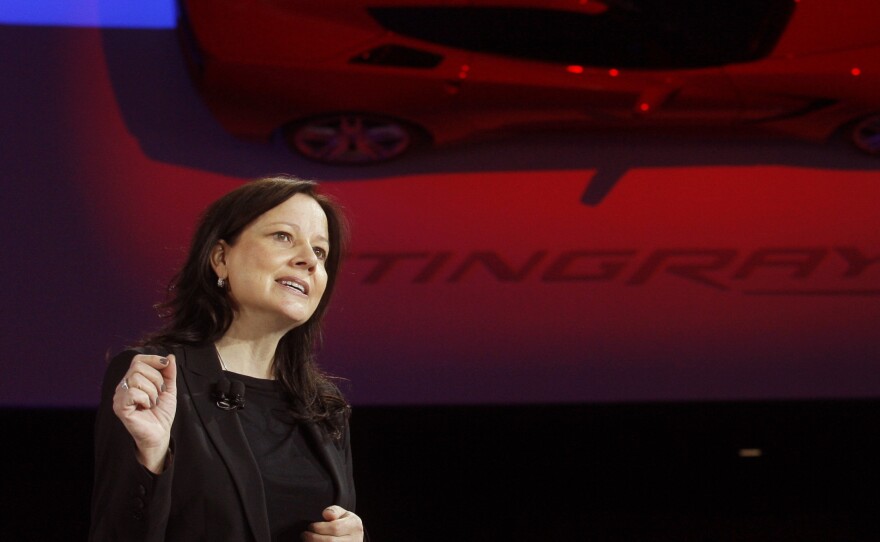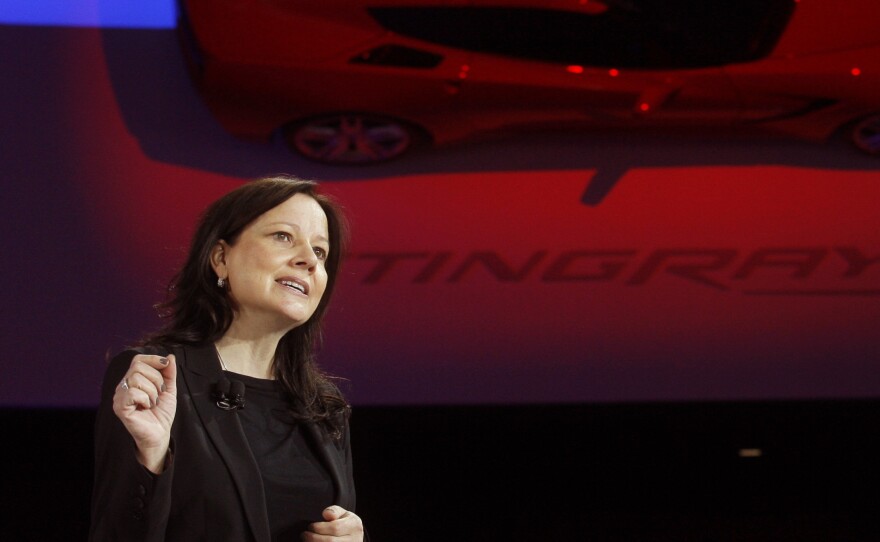
She's not the first woman to head a global corporation.
Ginni Rometty runs IBM, and Indra Nooyi heads PepsiCo. Don't forget Ursula Burns at Xerox and Meg Whitman at Hewlett-Packard. There's Marissa Mayer at Yahoo.
Still, when Mary Barra emerged on Tuesday as the new chief executive of General Motors, the announcement felt historic. Next month, the 51-year-old daughter of a GM factory worker will succeed retiring Dan Akerson as leader of the biggest U.S. automaker.
The automotive sphere has been seen as a guy thing since the first oil-splattered cars started rolling down dirt roads in the late 1800s. Even now in Saudi Arabia, women risk violence or arrest just for sitting behind the wheel of a car.
But in Detroit, Barra leapt ahead of men such as Mark Reuss, president of GM North America; Dan Ammann, chief financial officer; and Steve Girsky, vice chairman.
"It is remarkable because the auto industry has always been such a male-dominated industry," says Jerry Jasinowski, an economist and past president of the National Association of Manufacturers.
Just 1 in 5 workers in the auto industry is a woman, and a mere 4 percent of CEOs at all major U.S. companies are female. So Barra's promotion is a big deal. On the other hand, auto analysts say her elevation should not come as a surprise to anyone at GM because her career path has been so steady.
"She's been there 30 years. She has earned her stripes," says Stephanie Brinley, an analyst for IHS Automotive, a forecasting firm. "She is well-respected, and I don't see her having a problem. I think she will be accepted because of credibility -- she has it. "
It helps too that her late father was a GM die maker in Pontiac for nearly four decades. Barra got her bachelor's degree in electrical engineering at the General Motors Institute at Kettering University in Flint, Mich. She met her husband, Tony Barra, when they attended GMI. Her first job was at the plant where her father worked. GM gave her a scholarship to get an MBA at Stanford.
Being part of the GM family for so long "is part and parcel of who she is," Brinley says. "Everyone understands that she knows how to build things."
In various roles at GM, she has worked on cutting costs, streamlining management, working with suppliers and figuring out what designs will be popular. She understands that "you need to listen to your customers," Brinley says.
Since early 2011, Barra has led GM's vehicle-development operations. During that time, GM's Chevrolet Impala became the first U.S. sedan in at least two decades to be chosen by Consumer Reports as the best on the market. And Motor Trend picked the Cadillac CTS as car of the year.
Jasinowski says Barra not only has a knack for knowing what consumers want, but she may have fresher ideas about how to sell vehicles to all customers, not just men.
When it comes to TV commercials, "there has been excessive reliance on sports to carry the auto message forward," he says. "A lot of women love sports ... but the industry has gone overboard with the football stuff."
Anne Doyle, a former Ford executive and author of Powering Up! How America's Women Achievers Become Leaders, says the auto industry as a whole has been too dominated by men who think alike.
But that conformity changed at GM when the company accepted a multibillion-dollar bailout from taxpayers five years ago. "There's nothing like a crisis to force people to either retrench -- or to take risks and do things differently," she says.
After going through a bankruptcy and bailout, GM emerged with new directors. "They completely reorganized," Doyle says. "They changed the culture there."
Those changes helped "crack the steel ceiling," allowing a woman to rise, she says. Having a CEO who is also a mother of two might help GM attract talented women to work at the company, she adds.
"This will give GM a competitive edge," Doyle says.
NPR's Sonari Glinton contributed to this report.
Copyright 2013 NPR. To see more, visit www.npr.org.






